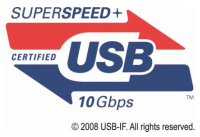
USB 3.0 has become a common sight in even low-end PCs, and that's great news. Its 5Gbps theoretical transfer speed is nearly ten times higher than USB 2.0's 480Mbps, but some external storage interfaces (most notably Intel's Thunderbolt) still offer faster speeds. The USB specification isn't sitting still, though. Yesterday, the USB Promoter Group announced that the USB 3.1 specification had been finalized and that it would double USB 3.0's theoretical transfer speeds to 10Gbps.
"SuperSpeed USB 10Gbps uses a more efficient data encoding and will deliver more than twice the effective data through-put performance of existing SuperSpeed USB over enhanced, fully backward compatible USB connectors and cables," read the announcement (PDF). "Compatibility is assured with existing USB 3.0 software stacks and device class protocols as well as with existing 5Gbps hubs and devices and USB 2.0 products."
The new spec will also be known as "SuperSpeed+," as seen in the logo above. Vanilla USB 3.0 is referred to as "SuperSpeed," while USB 2.0 is merely "Hi-speed." Intel Thunderbolt controllers in current devices already support these 10Gbps full-duplex speeds, and 20Gbps versions are on the way, but Thunderbolt's sluggish adoption outside of Apple's Mac lineup takes some of the pressure off of the USB Promoter Group.
While the finalized spec has been announced and the USB Promoter Group will be holding developer conferences in August, October, and December to promote the standard, it will still be quite a while before you see actual USB 3.1 ports in your hardware. The USB 3.0 spec was finalized all the way back in 2008, but third-party controllers and USB-supporting chipsets from AMD and Intel didn't begin to appear in large numbers until 2011 and 2012. In addition to new controllers, the new spec will require new USB 3.1-compatible accessories to achieve full 10Gbps speeds.
reader comments
159